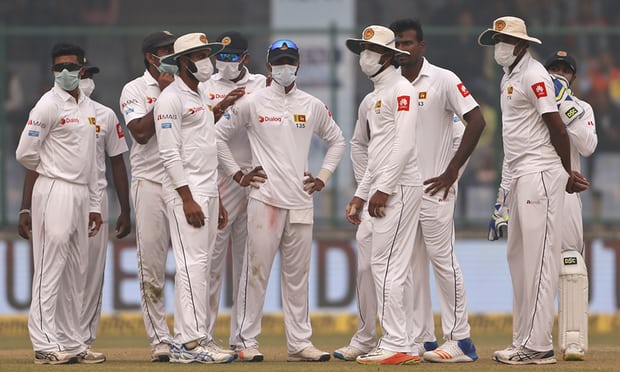Cricket is a game that is highly weather sensitive. Matches can be halted by even very light rain or poor light due to overcast skies, and fans are used to this. International games called Test matches between rival national sides last for five days, six hours per day, so there is plenty of time for weather to intervene. But this past week, a Test match between India and Sri Lanka was interrupted several times due to the heavy pollution that has blanketed New Delhi over the past month.
A cricket Test match between India and Sri Lanka was repeatedly interrupted on Sunday with claims players were “continuously vomiting” due to hazardous pollution levels in the Indian capital.
Commentators said it was the first recorded instance of an international match being halted due to the toxic smog that afflicts much of north India year-round but worsens to hazardous levels during winter months.
Airborne pollution levels 15 times the World Health Organisation limits confronted players on the second day of the third Test at the Feroz Shah Kotla stadium in Delhi on Sunday.
As the haze worsened, many Sri Lankan players returned from lunch wearing face masks before complaining to umpires, who halted play for 20 minutes to consult with team doctors and match officials.
The match resumed but was interrupted twice more as bowlers Lahiru Gamage and Suranga Lakmal left the field mid-over with breathing difficulties.
“We had players coming off the field and vomiting,” the Sri Lanka coach Nic Pothas told reporters after the match.
“There were oxygen cylinders in the change room. It’s not normal for players to suffer in that way while playing the game.”
Indian cricket officials initially pooh-poohed the concerns of the Sri Lankans, suggesting that they were either wimps or trying to find excuses for the fact that they were being outplayed by the superior Indian team. But then an Indian bowler also started vomiting on the field.
Indian health experts criticized the authorities for not calling off the game.
The Indian Medical Association also condemned the decision to let the Delhi test go ahead. “You have fast bowlers, batsmen and fielders out there exposed to these very harmful pollutants over five days at a stretch. It takes a serious toll on your health in the long run,” said the association’s president, KK Aggarwal.
Other health experts have also condemned officials for scheduling sports events during times when there is heavy pollution and said that the Sri Lankans were right to protest.
No one can play any games outside in this environment,” Dr Prashant Saxena, chief pulmonologist at the Max Smart Super Speciality Hospital, said.
…Dr Saxena told the BBC: “Any kind of physical exertion in this kind of air can cause difficulties in breathing, watery eyes and coughing – you need to be alert to play cricket, which is not possible in these conditions.”
Additionally, he added that a cricket stadium may actually heighten the effects of pollution, saying: “Ventilation is lower in stadiums, which means one could inhale more dust particles and toxic fumes.”
So in future, in addition to those statements that cricket fans are only too familiar with such as “rain stops play” or “bad light stops play”, we can expect to see “pollution stops play”.


“Max Smart Super Speciality Hospital” is a real thing that exists and not a joke setup from “Get Smart”?
It really is incredible that the Test was allowed to proceed. At least the Sri Lankans can go home. Consider the millions of people who live in such a toxic atmosphere 365 days a year.
I was wondering whether you’d write about this. I’m pleased that you did.
Quite remarkable, really. And I think, India being so taken with cricket, it may reach many people who otherwise would not give the consequences of rapid development much thought.
And Indian mining giant Adani purportedly wants to dig up millions of tons of not-very-good Australian coal and burn that at home, too. Fortunately only the dumbest conservatives are left supporting the mine now, most major banks have told him to get lost.